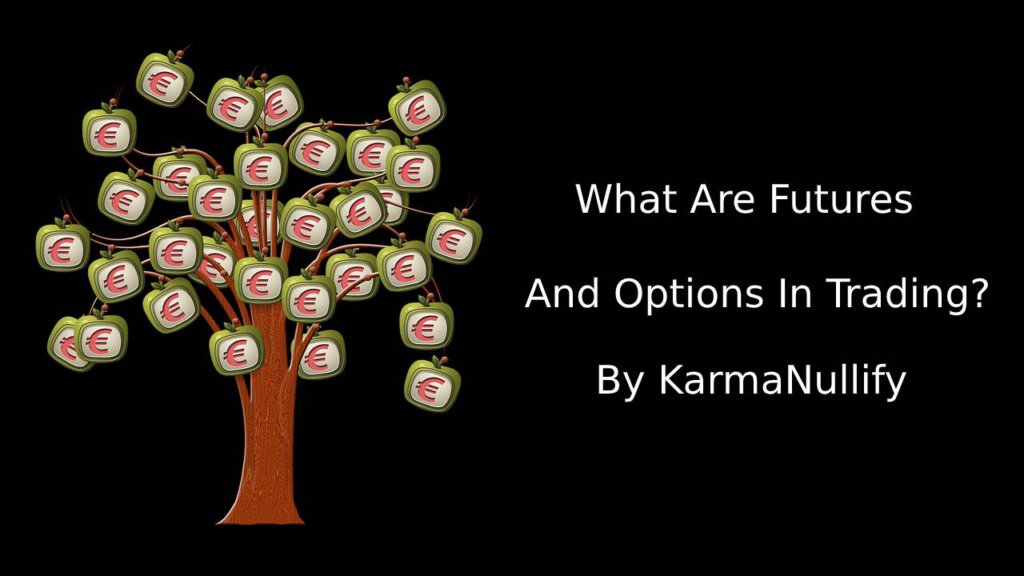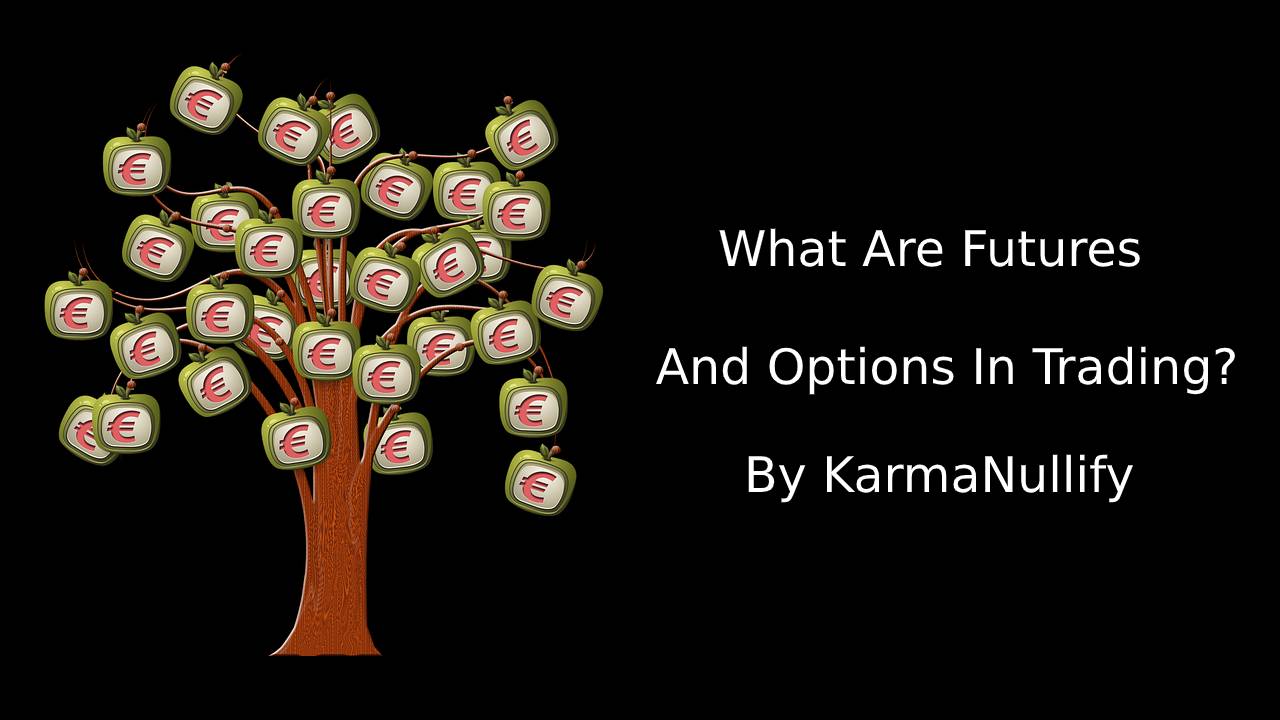|
|
What Are Futures And Options In Trading?
There are many segments in Stock Market like: (Cash) Equity segment and Derivative segment. Futures And Options are segment of Derivative market. Derivative market is an financial market just like Equity market but consist of Futures and option contracts that are derived from other Instruments like Stocks, bonds, commodities, etc.
While Equity and Derivative market are both segment of Stock market. Just like Equity and Cash market to trade in Futures and options you need an demat account. And make sure that Futures And Options segment should be active in your demat account.
What Are Futures And Options Contracts?
Options are of two types: Call option and Put option.
In Layman terms Options Contracts are nothing but an contract between option buyer and seller. And this contract gives option buyer an right to buy and sell asset before the specified date. The asset an option buyer bought before the specified date is known as Premium.
Closer the call and put options towards expiry lower will be the price of premium. Option sellers get benefit if premium price decreases as they sold it after receiving premium. But one have to be in margins to sell buy and put options. Option buying is beneficial when trend is momentum trading most people make money here when there is short term momentum.
While Futures contracts are financial contract which helps trader to buy and sell shares at predetermined future price or date. Future trading have maximum risk as we are buying here contract. Even in future trading one have to set margins.
Let say you have buy Rs. 5,00,000 worth of contract at margin value for Rs. 1,00,000. It means you are taking 5x more leverage that means more risky. So, risk management is must in future trading.
What Are Futures And Options with Examples:
Most people even some retail traders are not aware of What are Futures and Options of Derivative Market. Let’s understand it with an example:

Let’s start with Options. Options are somewhat similar to Health Insurance policy where you get premium. For example: let say i took medical insurance and Rs.10,000 is the Premium. if i have disease within a year, then insurance company will pay for it, if not i lose Rs.10,000. Similarly, call and put options also have premium just like insurance. Whenever we buy call or put, we have to pay premium.
Let say Ritesh bought reliance share price of Rs.2000 and he thinks that shares price will rise (that is market is bullish) then he will buy call option and if market is bearish then should buy put. One can sell both call and put. As per theory, trader sell call when they are bearish while trader sell put when they are bullish.
Now will take examples for Futures segment. The major difference between Equity and Future market is that You need to buy minimum one share while in Future market one at least need to buy minimum one lot. The size of one lot can be different for different companies. For example: one lot of HDFC Bank = 450 shares while one lot of Reliance Industry = 500 shares.
So when you are trading stock of Reliance industry in equity market the mininum no of shares you need is one while trading in Futures market you need minimum lot of Reliance industry which is around 500 shares. So why not just buy 500 shares in equity market ? why do we really need Future market?
Benefits Of Futures and Options:
The benefit of trading in Future market is that in futures you only need to pay margin amount. The margin is usually around 20 – 25%. The margins varies as per the share performance.
For example: Let say you bought 500 shares of Reliance industry (RIL) from Equity/Cash Market. The cost of one share of Reliance Industry (RIL) is right now Rs.2087. So the total amount you need to pay for 500 shares of (RIL) in Equity market = number of shares x value of one share = 500 x 2087= Rs.10,43,500. Let say the current margin of Reliance industry id around 25%.
So in Futures Market the amount you need to pay for 500 shares of Reliance Industry is 25% of Rs.10,43,500 which is around Rs. 2,60,875. So in Futures market you only need to pay margin amount (Rs. 2,60,875) instead of total amount (Rs.10,43,500) for 500 shares of Reliance Industry.
But in Future market the price of one share is most of the time is higher then the price of one share in Equity market. This hike price is basically premium. But sometimes the share price of Future market can be lower than cash market. This drop in in price is known as discount.
Another drawback of Future market is that one can hold shares till the last thursday of that month. while in Equity/Cash Market one can hold shares for long period.
For example: As per rule At a time three contracts are available for traders. Let say you bought one lot of RIL in futures at September 2020 then you can only hold the bought shares till the last thursday of that month which is 24 September 2020. You can sell those shares before expiry date but can’t them after expire date otherwise exchange will sold it on your behalf.
Let assume that the price of share drop drastically at last thursday then to avoid losses you can rollover to next month. So you can hold those shares for one extra month. Rollover basically means to do carry forward. It only happens in futures market. there is no rollover in options.
For example: let say you bought Reliance’s this month’s contract in future market . There is condition that in date of expiry you have to make sure that lot will not get square up, so to do that you need to carry forward. This process is basically rollover. you can carry forward your sell position to next month.
In Future market one can even sell shares before buying them but not in case of Equity market. This is known as Short selling. That sounds fascinating, isn’t it ? For example: Raghav thinks that shares price of “XYZ Company” will fall. So he sell the shares at current price. And as per his prediction the share price falls. So, he bought those shares back at low price. This is short selling.
Now you finally understand, What are Futures and Options and their major advantages and disadvantages through above examples.
Disclaimer: Investment in securities market are subject to market risks, read all the related documents carefully before investing. Please read the Risk Disclosure documents carefully before investing in Equity Shares, Derivatives, Mutual fund, and/or other instruments traded on the Stock Exchanges.
As investments are subject to market risks and price fluctuation risk, there is no assurance or guarantee that the investment objectives shall be achieved. Past performance of securities/instruments is not indicative of their future performance. This post is only for Educational purpose.

Resources this kind of as the one you mentioned here will be incredibly helpful to myself! I will publish a hyperlink to this page on my particular blog. I am sure my site visitors will discover that very beneficial.
I have read several good stuff here. Certainly value
bookmarking for revisiting. I surprise how so much effort you put to make such a excellent informative website.
Hello! I know this is somewhat off topic but I was wondering
which blog platform are you using for this
site? I’m getting fed up of WordPress because I’ve
had issues with hackers and I’m looking at options for another platform.
I would be awesome if you could point me in the direction of a good platform.